Have a toddler who cries all the time, or an older child who is always crying? Learn hidden reasons why your 1, 2, 3, or 4 year old constantly cries and how to help sensitive kids.
He was probably about 4 years old, and since he was my oldest child, he seemed so much older than my other kids. Being the oldest has some down sides, I speak from experience.
Sam was standing in the middle of the living room crying. Again. I can’t remember what he was crying over, but it’s no wonder that I don’t because he was often crying. I remember thinking that he was getting older and should be growing out of crying over “every little thing.” I’d like to think that I wasn’t mean, but I was being stern with him as he stood there crying.
I was tired and just wanted him to stop.
My mom was visiting at the time and was knitting away on the couch seemingly not paying attention. But, what she said next changed how I parented Sam forever. My mother, observing the familiar scene unfolding yet again, said, “I think he’s really having a hard time, he feels a lot. I felt like that as a child and I was always labeled as a cry baby. It made me feel terrible. I don’t think this is a phase, it’s part of who he is.”
It was a jarring moment that stung a little, but more than anything, I was grateful.
That was a turning point when I began to be on Sam’s team, to try and see what he was struggling with and why.
Why Does Your Child Cry All the time?
What really made the difference in my mom’s words is that I now had an understanding as to why Sam was crying so much, it immediately resonated with me. I knew it was true.
It’s not always this easy getting to the bottom of our kid’s challenges, but we often do have some intuition about it. Beyond being able to understand the crying though is knowing how to help them.
As an occupational therapist, I’ve worked with a lot of crying kids, but constant crying can have a lot of different reasons behind it. The list below is not comprehensive, but does include some little-known causes for a child that cries all the time.
Two factors that can really muddy the waters are when a child has experienced trauma/attachment issues, as well as bigger behavioral issues.
In my experience, these are far more rare, but if you have concerns, discuss them with your doctor or seek the help of a child therapist.
1. Sensory Processing
Sensory issues can affect so many aspects of our kid’s lives, and when children tend to avoid or are sensitive to certain sensations, it can leave them on edge, even physically uncomfortable!
We all have sensory needs and preferences that we are born with, so sensory processing can be a big factor for why your child constantly cries, whether they are 1, 2, 3, 4 or beyond.
It can be easier to dismiss constant crying in younger babies and toddlers, but as I mentioned before, for many kids, crying like this is not a phase and more so a marker for their temperament and personality.
But, having sensory “issues” or needs doesn’t necessarily mean your child has or needs a diagnosis, which is why this can be hard to miss. Some kids can’t stand getting messy, hearing loud noises, or wearing certain textures of clothes.
Lights or smells could be bothersome, and the worst part is they may not know how to tell you, especially young children and toddlers.
That means, if they’re smelling something that they think is awful or lights are buzzing and annoying them, they may cry.
Read more about visual sensitivities and smell sensory sensitivities and how they impact kids.
But, all we see is a 2 year old crying in the middle of Target or an 8 year old that cries at the smallest occurrence after a long day of sensations he can’t control at school. When your toddler or child cries all the time, it’s easy to overlook underlying reasons for why.
To understand more about sensory processing and your child’s unique needs I highly recommend taking our free sensory workshop. You can grab a spot here!
2. Sensitive Personality
While crying all the darn time is annoying, some kids are experiencing emotions and don’t know how to handle them. The outlet is to cry. A child sees the world quite differently than we do and what seems like a small inconsequential thing to us could be very difficult for them.
In recent years, the term “highly sensitive child” has been used more and more to describe this type of kid.
If nothing else, it may be helpful to consider that your crying child needs some extra time and space to deal with everything they’re feeling.
Of course, kids do, at times, use crying to get what they want, and I think as parents, it’s often one of the the first things we jump to, but for our kid’s well being, it’s important to step back and see the bigger picture of what’s going on.
3. Anxiety
In my son’s case, I know that he feels a lot, and as he’s getting older, he probably cries more than his peers. He’s at an age where he’s becoming self aware, and in some situations, he is curbing the instant crying.
I can see that his personality is part of why he tends to cry, but two years ago, we also had to work through our first episode of anxiety.
I didn’t realize that’s what it was at first, and on top of the constant crying, there was now a fear too. For Sam, this showed up as separation anxiety, even though I had never seen that in him before.
That fact made it even harder because I thought he needed to snap out of it.
But, anxiety is tricky and younger kids may not be able to express how they’re feeling and why. The result we see is a lot of crying or “being sensitive”. If you suspect that your child is struggling with anxiety check out this incredible resource from my good friend and child therapist Natasha Daniels.
4. Lack of sleep
Be careful not to skim past this one, because many kids aren’t getting the recommended amount of sleep daily. Some kids will only sleep for a certain amount of time despite their parents best efforts and that becomes the norm for them.
But, over time, that constant sleep deprivation can have a big effect on their behavior.
Again, this can show up as frequent crying. Check out this recommended sleep guide for kids and also check out How to Help Your Child Sleep.
5. Poor eating
Similar to sleep, poor eating can also have a big effect on behavior and mood. When kids aren’t getting the calories, fat, and nutrients they need, they may feel irritable, but again, don’t have the skills to tell us that.
This is easy to miss with extreme picky eaters who struggle to ever eat well. Get more help for picky eating!
6. Communication skills
Children and toddlers that cry all the time and don’t have a lot of words or communication may be crying out of frustration. They can’t express themselves!
As an occupational therapist, I’ve said countless times to kids, including my own, “Use your words,” when I see frustration building. Sometimes this is a helpful cue, even if they’re using a bit of sign language.
Other times, it can make matters worse if they’re too upset to focus on speaking, or your child has a speech delay. Visuals can be a big help in these instances, or moving straight into some grounding activities to help them calm down.
What if Your Toddler Cries All the Time?
It’s quite common for toddlers to cry all the time, especially when there’s a speech delay. But, even if there’s not, toddlers are learning to manage their emotions. They’re also testing reactions and figuring out how to navigate their environment.
As difficult as it can be to listen to, the frequent crying is something well within normal toddler behavior.
However, there are ways you can help them learn to regulate their emotions, often this starts with helping them communicate better. Try teaching your toddler some basic sign language for common phrases like “All done” and “more.”
Lastly, follow the steps listed below, they work perfectly for toddlers too!
Are they really crying all the time?
For me, the constant crying that I also later experienced with my third child as a toddler, grates badly on my sensory system. If I’m tired or trying to focus on something, it’s even worse.
Can you relate?
Kids are incredibly perceptive and sometimes our own impatience, emotion, and arousal state can leak into our kids’ behavior. If your 3 year old cries all the time, it can feel exhausting and put us on edge.
When kids cry frequently, our patience level is depleted and all we focus on is the crying. And, in truth, some kids do cry a lot, but it may be helpful to think about the times your child isn’t crying, as well as look for patterns when they are.
What feels like excessive crying could be either developmentally normal, or just be what you see because you’re focused on it. Trying to identify when it’s happening can help.
For instance, you may notice that it’s at certain times of day and can connect that to an overwhelming daycare environment, being hungry, or tired.
How to Help Crying Kids
So how do you help your child and maintain your sanity when you have a child that cries all the time? Let’s talk about some basic strategies you can start using today:
1.Have a Mindset Shift – We’ve already talked a lot about this, but think about seeing your child as needing your help instead of the crying being a problem. Crying is a form of communication, whether we like it or not, and once we start to see it that way, it gives us reserves of patience to rely on.
2.Comfort Your Child – For generations, kids have been raised to “shake it off”. While I think there’s some wisdom in that, we have to be careful we’re acknowledging our child’s feelings and letting them feel heard.
However, it’s just as important to teach them how to manage their feelings as well.
3. Teach Them Coping Strategies – Depending on your child’s age, the coping strategies could vary widely from teaching deep breaths, to modeling a calm down song. Older kids may benefit from journaling, while younger kids may need some snuggles.
No matter what age, kids can be taught to retreat to a private safe place and then talk it out when they’re calm. You can even consider providing them a sensory room or space to calm down. It doesn’t need to be fancy or expensive!
4. Take Care of Yourself – Even with a mindset shift, the crying can get to be A LOT, and making sure you’re taking care of yourself may be the best thing you can do for yourself.
That might mean hiding in the bathroom for a minute to catch your breath or having a cry yourself. It’s always a good idea to pay attention to your own levels of regulation to both model it for your kids, but to also “fill your own cup” first if needed.
21 Sensory Red Flags that are Easy to Miss
If you’re suspecting that sensory processing difficulties or sensory processing disorder could be at least one of the reasons your child cries frequently, grab our free printable 21 Sensory Red Flags. You’ll find some of the most common sensory “issues” that kids display and go unnoticed.
More for Sensitive Kids
Create a Sensory Diet with this Template: Free PDF
8 Secret Strategies for Sensory Issues with Food
5 Ways to Stop Mealtime Tantrums for Toddlers and Kids
11 Fun Weighted Lap Pads to Help Kids Sit Still
Alisha Grogan is a licensed occupational therapist and founder of Your Kid’s Table. She has over 19 years experience with expertise in sensory processing and feeding development in babies, toddlers, and children. Alisha also has 3 boys of her own at home. Learn more about her here.
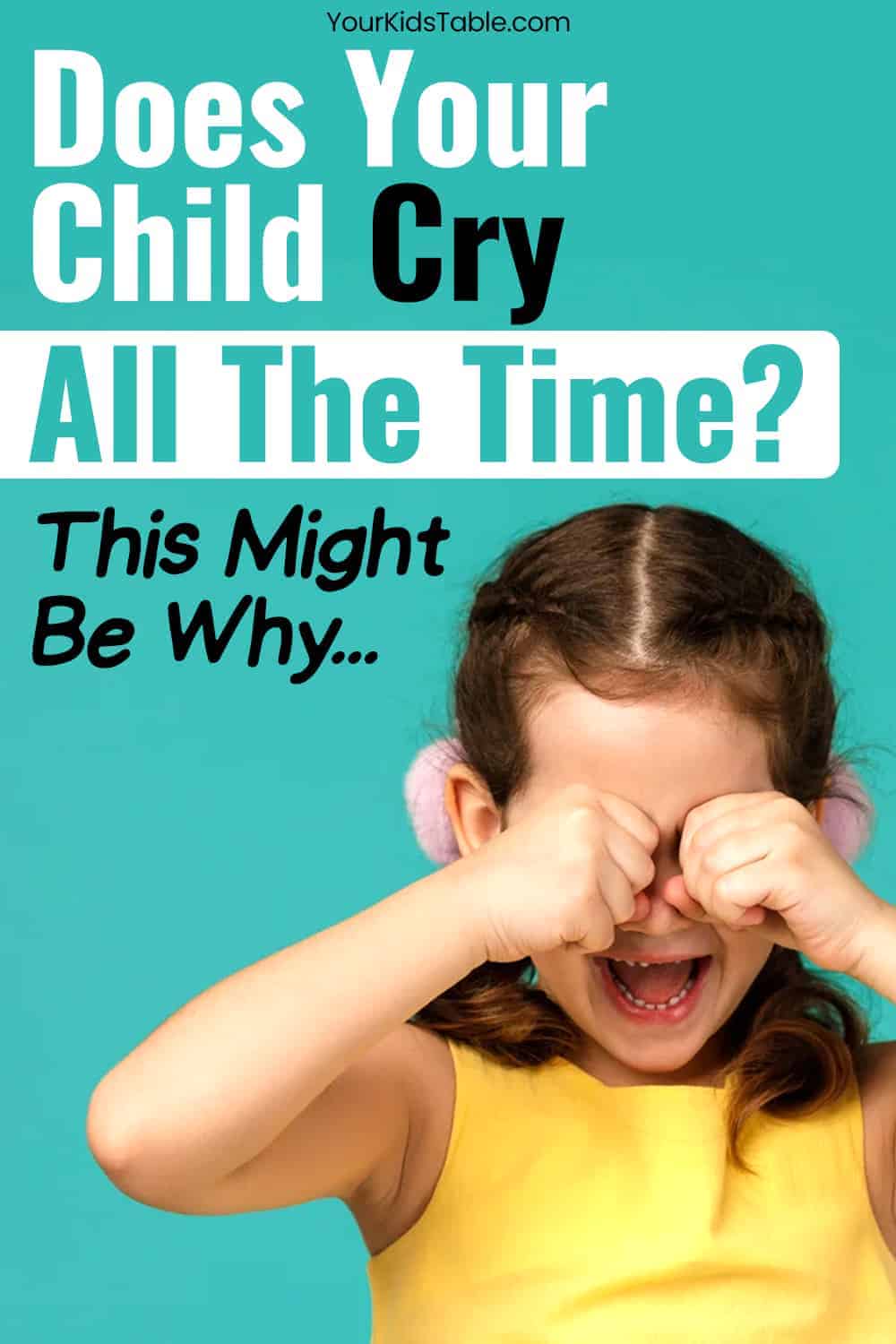
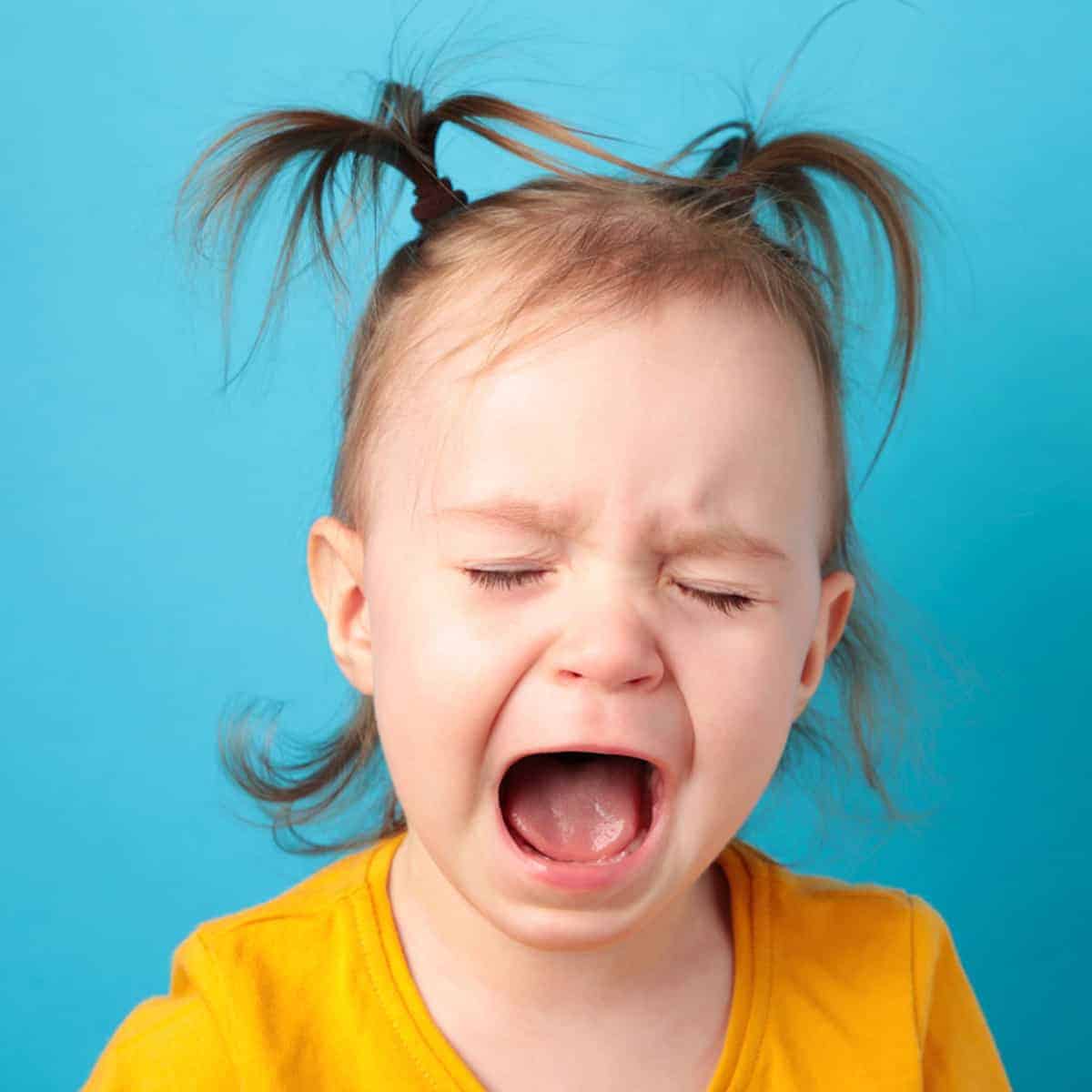
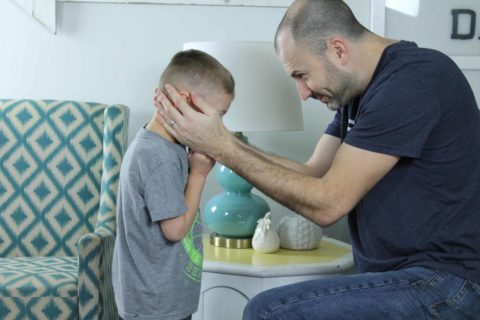
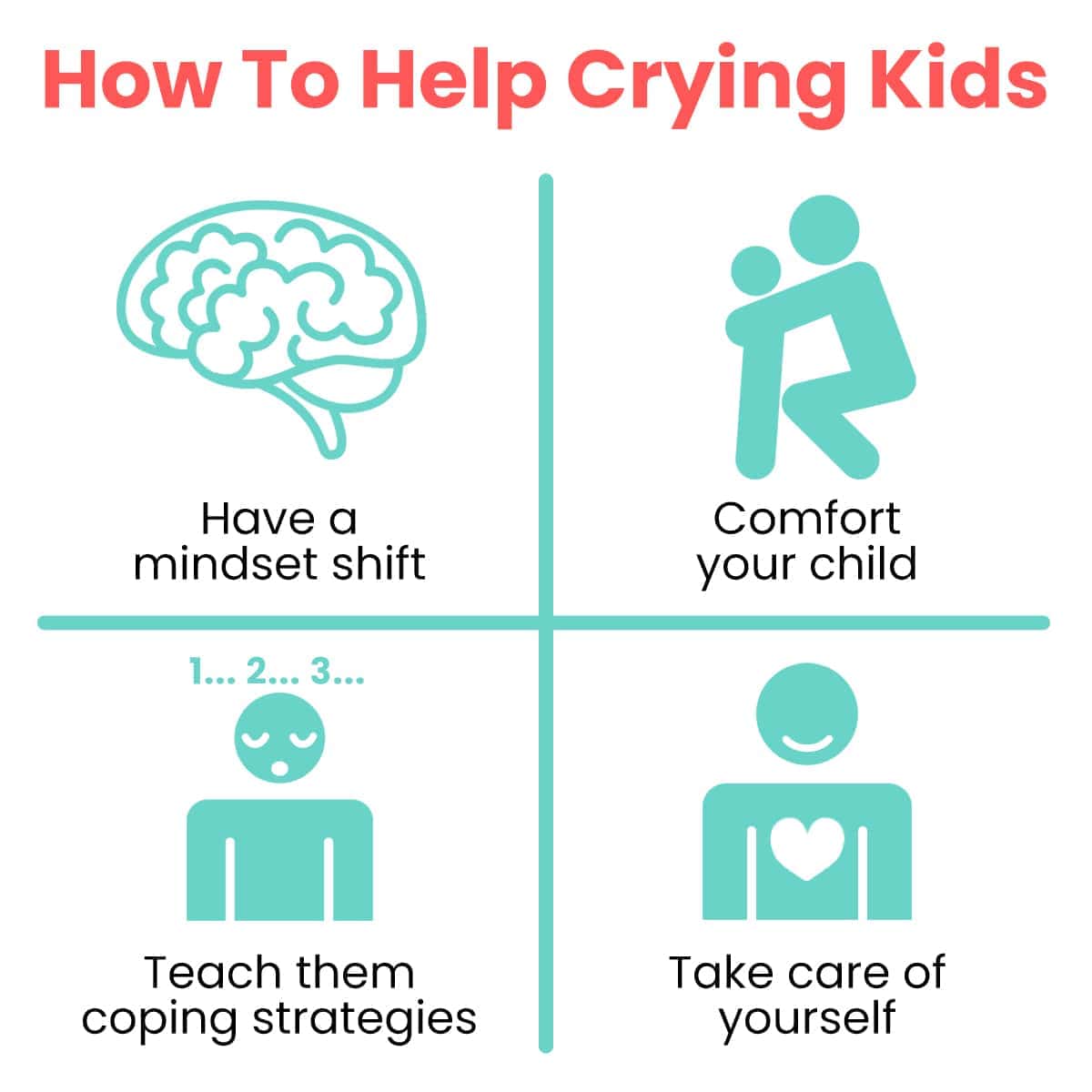
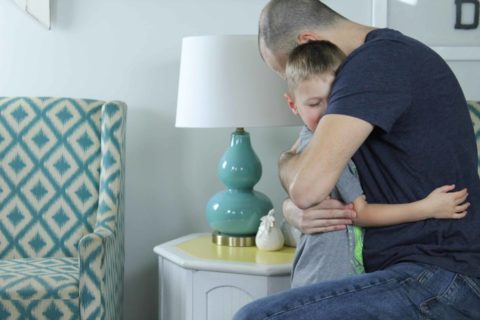
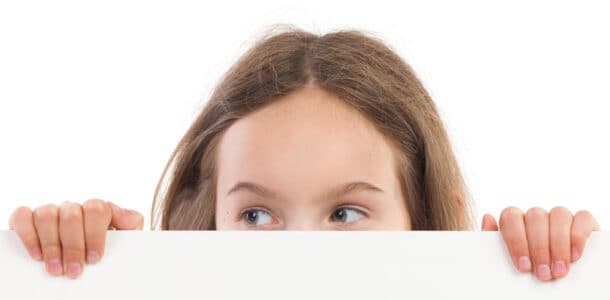
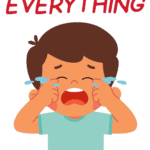
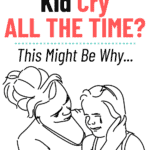
Please help as well! My 20 month old non stop cries. He cries sometimes upward to 75% of the day when I’m around. When I’m not around, people say he’s an absolute joy! Plays with toys, laughs, the whole 9! But when I’m around he wants me not only to hold him but if I’m not standing up, he screams and throws his head back and just will over all not calm down. I love him so much and spend as much time as I can playing with him but I have another child who feels left out. On top of that I have a house to clean, dishes to do, laundry to fold and make meals. I have a job from M-Th 7:30-330. I took this position to spend more time with my kids. So it’s not like I’m an absent parent that he doesn’t get to spend a lot of time with. My first child wasn’t like this so I just need help! Please send advice!
Hi Britt,
Does your kiddo have any other behaviors that may be indicative of the reason for crying? Like sensory sensitivities, allergies, etc.? 75% of the day is a lot, I’m wondering if something else is going on. I would definitely check out some calming proprioceptive activities, which almost all kids find regulating. Start there and see if it helps give him some sensory input that he’s craving.
Best,
Laura
Your Kid’s Table team member